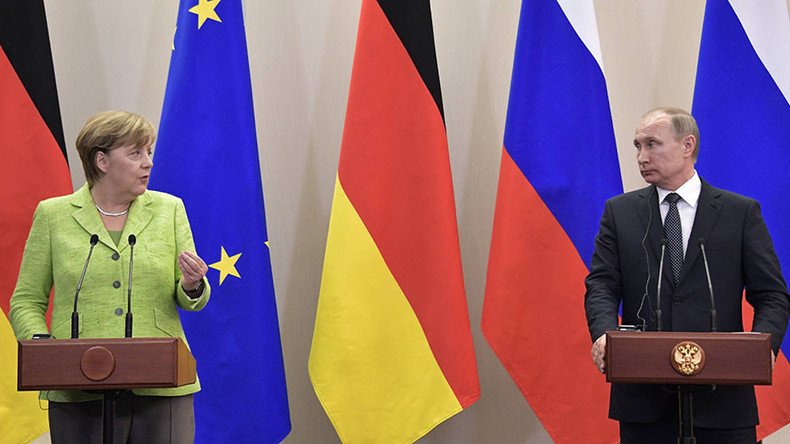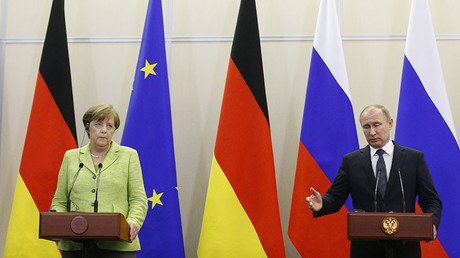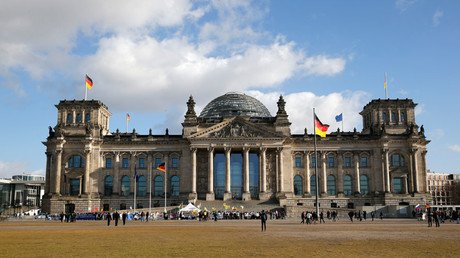Merkel & Putin in Sochi: Frau Nein & Mr. Nyet agree to disagree

It’s been a busy couple of days for Vladimir Putin. He’s welcomed Angela Merkel and Recep Tayyip Erdogan to Sochi and engaged Donald Trump on North Korea and Syria.
Even if she loses power this year, Merkel’s visit mattered greatly. The prevailing situation where Europe’s last two great powers, Germany and Russia, are at loggerheads benefits nobody on this continent. That said, it suits the fundamental US foreign policy goal of preventing a Russian-German rapprochement, which is the only realistic threat to its continuing dominance of the Eurasian space.
German-Russian relations have always fluctuated ferociously. From alliance to all-out war, with interregnum periods ranging from fulsome friendship to nervous mutual suspicion. Right now, it’s fair to say the pendulum is fixed to the latter position. And this situation is tragic for a struggling Europe.
In the past two hundred years, the pair have been all over the shop. After Russia helped liberate the Germans from Napoleon, they got on pretty well for most of the 19th century. However, at the start of 20th, the Kaiser and Tsar fought each other in the Great War before finding accommodation in the 1920’s as Teutophile Vladimir Lenin promoted connections with Berlin, a fellow pariah at that juncture. The detente didn't last long. Because the Weimar Republic collapsed into fascism, and soon ideological opponents Adolf Hitler and Josef Stalin were engaged in various proxy wars, most notably in Spain.
By 1941, the Nazis had invaded the Soviet Union in Operation Barbarossa, at one stage reaching the outskirts of Moscow. But the Russian-dominated forces fought back and eventually captured Berlin in 1945. As a punishment, the Kremlin seized some German territory for Russia and reassigned more to Poland, which had suffered terribly as the two great powers clashed. To add insult to injury, for the next 44 years, the USSR maintained de-facto control of around 30 percent of the shrunken nation, through its GDR satellite.
Changing Times
Then 1989 happened. The Berlin Wall fell, encouraged by Mikhail Gorbachev’s reforms, as Russians themselves gradually renounced communism and totalitarianism. Within the next two years, the mighty Soviet empire crumbled, Germany was reunited, and Moscow became the capital of a condensed Russian Federation. Nevertheless, the shriveled state remained the largest, and most populous, country in Europe.
Former Chancellors Helmut Kohl and Gerhard Schroeder recognized the pivotal continental role of Russia and went to great lengths to establish a partnership. Particularly the latter, who compensated for his fractious relations with George Bush’s America by courting Putin. But this ‘Ostpolitik’ has dwindled under Angela Merkel, who found a spiritual ally in fellow liberal Barack Obama. After Putin espoused conservative policies upon his return to the Presidency in 2012, the two capitals were divided over values once again.
We saw the effects of this in Sochi, with no discernible signs of personal warmth between the two leaders, even if Putin showed better manners than Trump by engaging in an enthusiastic handshake. There was also a sense that this could be Merkel’s final visit to Russia as Chancellor, with polls suggesting a Martin Schulz-led coalition could displace her in September.
Despite the ridiculous hysteria about unproven Russian meddling in the US election, Merkel looked unfazed when asked if she feared similar nonsense in Germany. However, Putin seemed annoyed at the lazy caricature. “You have referred to an example that hasn’t been proven by anyone or anything. These are merely rumors that are being used in US political in-fighting,” he told the questioner before pointing to numerous instances of foreign interference in Russia’s domestic politics. Merkel herself said: “we expect the German election will go ahead unharmed and that we have enough different positions to tackle a range of topics.”
East of the ether
Meanwhile, both sides seemed bored with Ukraine. Instead of suggesting new solutions, they pointed to the stalled Minsk agreements. Which suggests the topic is parked. Still, Putin criticized the pro-Western administration in Kiev, saying it was forcing the separatist eastern regions further away with blockades and power cuts.
This, of course, contradicts Berlin’s usual position. Notably, according to the supplied handouts of their later call, Putin and Trump didn’t discuss the topic either.
That said, the 2013-14 Ukraine crisis has ruptured kinship severely. Whether Berlin sincerely wanted Kiev to redirect to the Western sphere of influence, or was merely asleep at the wheel is moot. Assuming it’s the latter, then sheer ineptitude allowed Sweden and Poland’s pro-American foreign supremo's, Carl Bildt and Radoslaw Sikorski, to hijack EU policy in the former Soviet space. While the pair have since been rewarded with plum positions in the think tank racket, others are left to pick up the pieces of their disastrous meddling.
To any informed observer, it was always clear how EU association member status would compromise Ukraine’s historical ties with Russia. And the outcome has been a divided nation, which is economically ruined. The Crimea issue also splits Berlin and Moscow. Here, the Kremlin likes to point to how, in 2008, Germany accepted the emergence of Kosovo as a new state, when it was still formally a province of Serbia, but sanctions Crimean residents for exerting their right to self-determination.
The Ukraine imbroglio has also impacted Russian-German trade. For instance, in 2012, German exports to Russia were worth some $42 billion. But, by 2015, this had fallen to $24 billion. As a result, there have been grumblings from German industrial leaders, and many politicians, for some time now, about the futility of sanctions.
New champion
Since Donald Trump took office in Washington, many commentators have labeled Merkel the new “leader of the West,” and she took up Obama’s liberal mantle by raising the specter of Chechnya’s treatment of gays. “We talked about that fact that I received very negative reports on what is going on with homosexuals in Chechnya and asked Mr. President to exert his influence and make sure that minorities’ rights are respected there," she said. This refers to allegations of how gay men have been tortured and even murdered, in the Islamic province. Chechnya is part of the Russian Federation, but in reality, largely self-governing since a series of brutal wars there in the post-Soviet years.
Further mention of Obama brings to mind his bizarre 2015 comments on Russia’s status. An incredible error of judgment which will probably adorn his eventual obituary notices: “today it is America that stands strong and united with our allies, while Russia is isolated, with its economy in tatters.”
Merkel herself has often been guilty of similar arrogant hubris when it comes to Russia. Once reportedly saying“Russia has nothing, no successful politics or economy. All they have is this (aggression or strength).” Now, while this may endear her to Russophobes, it’s not grounded in any form of reality.
Russia is central to the biggest issues concerning Europe. It’s the continent's largest country, its greatest military power and controls the vast majority of its natural resources. Furthermore, it’s Europe’s most populous country and boasts the second most sizable economy (after Germany) when measured by purchasing power parity. And is surely the heftiest if you include the immense black economy in calculations.
Informal economy in #Russia grows to record levels https://t.co/RlRU9WwFuW
— RBTH (@russiabeyond) May 1, 2017
Also, Moscow is pivotal to the resolution of the Ukraine and Syria situations. Not to mention how a resurgent, post-sanctions, Russian consumer class could significantly stimulate the moribund EU economy by loosening its purse strings again. Thus, it’s clear how a return to the principles of “Ostpolitik” is in Germany - and Russia’s - best interests.
Merkel's hostility to the Kremlin and her haughty disregard for Russian concerns means she can’t restore the relationship. As a result, Moscow will surely be hoping that this was “Frau Nein’s” final official visit to Russia. And they can rebuild ties through a future Schulz-led center-left government in Berlin. But this won't be a walk in the park either.
The statements, views and opinions expressed in this column are solely those of the author and do not necessarily represent those of RT.















